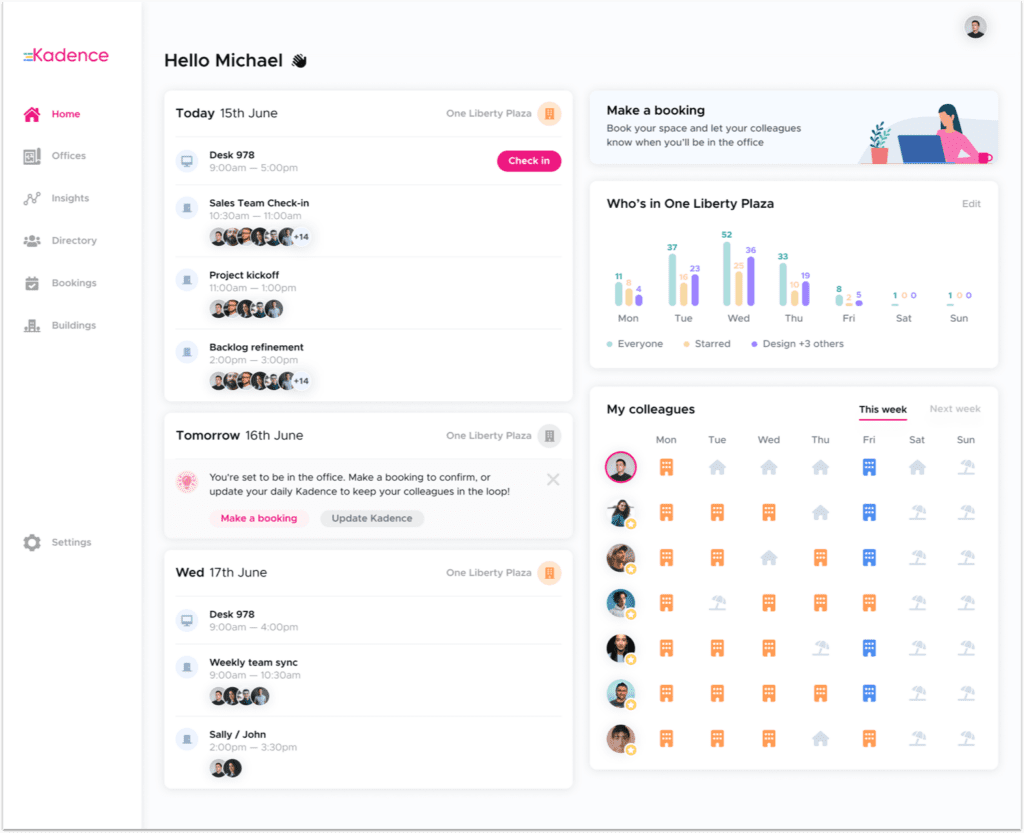Hybrid OS: Your Company’s Hybrid Workplace Operating System
Have you installed your Hybrid Workplace Operating System yet?
Hybrid OS: the new hybrid workplace operating system that countless businesses worldwide depend on to help manage their people, projects, and spaces.
Now, of course, we don’t mean an actual operating system (like Mac or Windows). But it’s high time we began to view hybrid work — the policy, not the loose concept — as a platform that is just as fundamental to business as the way operating software is to computers.
Let’s take a look at 5 surprising parallels between hybrid work and a computer’s operating system.
1. They both provide the foundational framework
Just as an operating system provides the foundation for software and applications to run on a computer, a well-implemented hybrid policy establishes the fundamental structure for how a company operates.
Not only does it provide the rules and processes for a company’s core work practices, but hybrid work ensures that every single employee in the company is working from the same platform and basis — and that they are empowered to flourish from that platform.
The importance of this framework cannot be understated: with uncertainty at an all-time high in the working world, hybrid work ushers in much-needed structure and stability.
2. Their primary goal is optimization
An operating system acts as the brain of the computer — with optimization as its primary goal. It manages the computer’s resources as efficiently as possible — from memory and processing to storage and task coordination.
In the same way, hybrid work acts as the brain of a business. Tools for hybrid work manage the whole catalog of resources overseen by a company — from its employees and their work Kadences to its physical workplace and office neighborhoods. Hybrid ensures a company is optimized across all of its processes.
Modern computers run smoothly only because of the work put in by their operating systems in the background. The same applies to hybrid work.
Hybrid work is like the operating system of a computer: it’s the adaptable framework that ensures a business can run smoothly and efficiently
3. They both adapt to the needs of their environment
Operating systems are built to adapt to changing conditions, such as software updates, hardware upgrades, or the installation of new applications.
See the parallel? Hybrid work is implemented precisely to adapt to an ever-changing workforce and professional environment.
Its intrinsic flexibility allows companies to cater to the unique needs of each individual — whether that be in specific circumstances necessitated by a new hire, or the evolving needs of existing employees or teams. (Or indeed external conditions like, dare we say, a global pandemic!)
Every company is composed of unique individuals. The more your operating system understands them and molds to them, the higher your chances of individual and collective success.
4. Coordination and communication run in their DNA
An operating system is designed to facilitate communication between hardware and software components within a computer. It even lays down the language for these different components to speak to one another, learn from one another, and develop together.
A well-implemented hybrid policy does exactly this. With the right software in your employees’ hands, you’ll find team coordination and communication reach an entirely new level.
Meeting management; desk booking; office attendance; and equipment usage: hybrid work synchronizes the key communication lines of a company and ensures everyone is speaking the same language. This openness is crucial to building a healthy and efficient business.
5. They provide an actionable user interface
An operating system’s user interface affects how users interact with the computer. It enables each user to make a concrete decision regarding their next move — and allows them to plan several steps.
Hybrid work tools offer similar benefits. In giving employees an actual dashboard for their company and colleagues’s work processes and schedules — they can take concrete steps towards organizing their own time and work schedules more effectively.
Seeing starred colleagues and their planned attendance, or where relevant meetings are scheduled to happen, lets each team member know when it’s worth them coming into the office — so they never have to waste another commute. An operating system provides the whole interface and dialogue for important day-to-day decision-making to happen.
If you are interested in how exactly to upgrade your company’s operating system, and how best to implement hybrid work policies, we’d love to hear from you. Don’t hesitate to get in touch!
Dan Bladen
CEO & Co-Founder
Dan is at the helm of Kadence with a sole mission to turn workplaces into vibrant, happy spaces where everyone can thrive. When he’s not busy changing the world of work, you’ll find Dan soaking up the natural, untamed beauty of California’s outdoors with his family on camping adventures.
Read More from Dan Bladen



